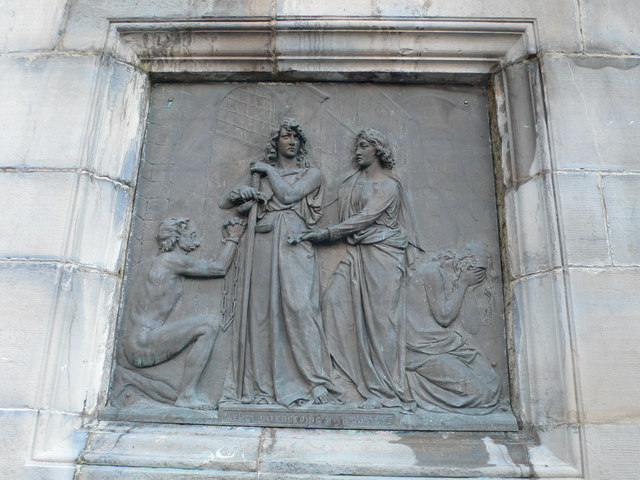
A bronze relief by Mario Raggi depicting one of the various charitable acts of Dr. Evan Pierce on the column in the Evan Pierce Memorial Garden in Denbigh, Wales.
Image © Copyright Eirian Evans and licensed for reuse under Creative Commons Licence.
The hymn I picked today from Sing Praise was ‘There’s a wideness in God’s mercy’ by Frederick Faber. John points out that the hymn is a shortened version of another, older hymn ‘Souls of men, why will ye scatter?’ (or in a modern inclusive version, ‘Righteous souls, why will you scatter?’) with an extra 8-line verse (or two 4-line ones) at the start, setting the scene for the rest of the hymn in humanity’s tendency to wander from God. That’s what he used in morning prayer, to a different tune. But it’s the Sing Praise book that I’m blogging this year, and coincidentally our own church music group sang ‘There’s a wideness in God’s mercy’ to the same tune Coverdale before last Sunday’s service. So that’s my starting point.
The words of the hymn tackle some misconceptions of the Christian understanding of God. Is the greatest virtue that of liberty (verse 1)? No, greater virtues are mercy and justice, seen in the Bible as two aspects of God’s character as well as the basis of good human law – not opposed, but as the two sides of the balance that make liberty workable. If the rule of law strays too far towards strict justice, people get punished for innocent mistakes, while too far towards mercy and the guilty go unpunished. God is not a vengeful deity but one who demands and administers justice with mercy: ‘there is no place where earth’s failings have such kindly judgement given’. The opposite is in verse 2: ‘We make his love too narrow by false limits of our own, and we magnify his strictness with a zeal he would not own’.
God is also not remote and unfeeling: ‘there is no place where earth’s sorrows are more felt as up in heaven’. And in verse 2, ‘the heart of the Eternal is most wonderfully kind’. Which is why he became one of us, sharing our emotions as well as our temptations.
The third verse focuses on the sacrifice of Jesus. ‘There is plentiful redemption through the blood that has been shed, there is joy for all the members in the sorrows of the head’. The final half-verse (if an 8-line tune such as Coverdale is used) challenges us to be more simple in our love for Jesus, to take him at his word. Meaning perhaps sayings such as “Unless you change and become like children, you will never enter the kingdom of heaven.”
